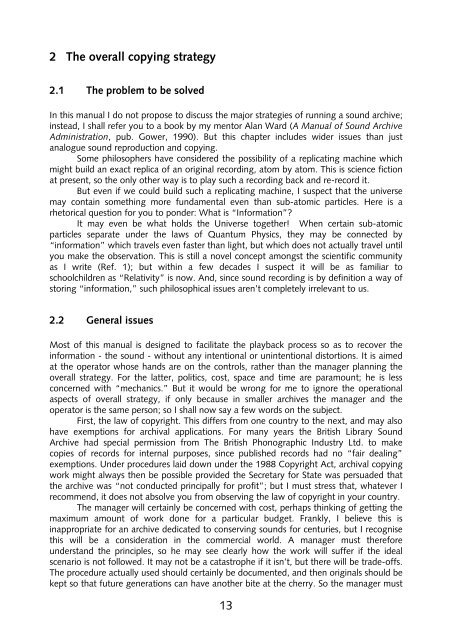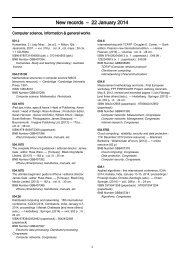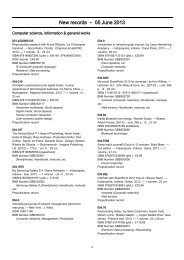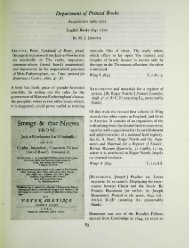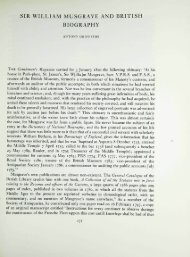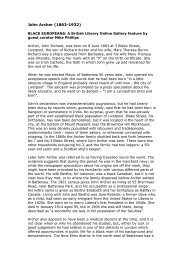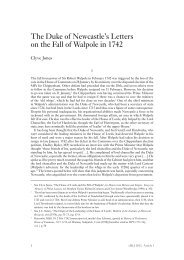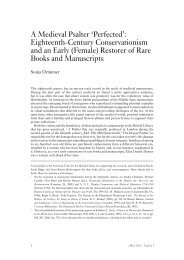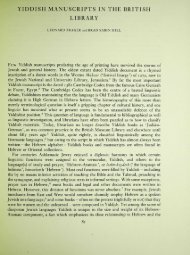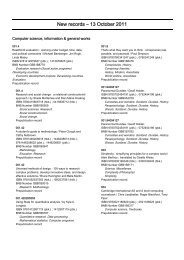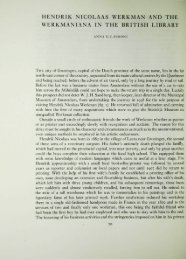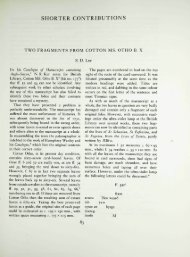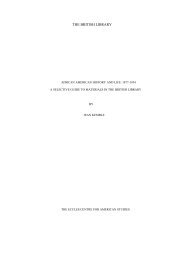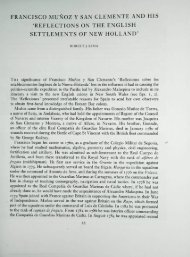- Page 1 and 2: MANUAL OF ANALOGUE SOUND RESTORATIO
- Page 3 and 4: CONTENTS iii Analogue Sound Restora
- Page 5 and 6: Analogue Sound Restoration Techniqu
- Page 7 and 8: vii Analogue Sound Restoration Tech
- Page 9 and 10: Acknowledgements Few types of tortu
- Page 11 and 12: In many other cases, we are compara
- Page 13 and 14: the principles, and leave operators
- Page 15 and 16: for us. But few people appreciate t
- Page 17 and 18: knowledge. To be brutal about it, a
- Page 19: 3. Present-day analysis of survivin
- Page 23 and 24: 2.4 Restricting the bandwidth With
- Page 25 and 26: Sound Archive, we have an interest
- Page 27 and 28: 2.8 “Partially objective” copie
- Page 29 and 30: This writer happens to believe that
- Page 31 and 32: commercial electrically-recorded di
- Page 33 and 34: Unfortunately, such misunderstandin
- Page 35 and 36: the noise), but to add the dither w
- Page 37 and 38: equired extra bits. (SACD needs sli
- Page 39 and 40: strip off the pre-emphasis flag, an
- Page 41 and 42: The “advantages” of lossy digit
- Page 43 and 44: copyright software evaporate. But t
- Page 45 and 46: All this is quite apart from a mach
- Page 47 and 48: equipment (section 2.11), and becom
- Page 49 and 50: 4 Grooves and styli 4.1 Introductio
- Page 51 and 52: open saucer of lukewarm water near
- Page 53 and 54: away from the turntable centre. Thi
- Page 55 and 56: 4.6 U-shaped and V-shaped grooves I
- Page 57 and 58: If one tries to cut a groove of U-s
- Page 59 and 60: possible to make the polishing-beve
- Page 61 and 62: - exactly where steel and jewel sty
- Page 63 and 64: From 1953 to 1959, the British Stan
- Page 65 and 66: no cantilever at all, so when the c
- Page 67 and 68: angle. It may be necessary to “mi
- Page 69 and 70: Although my next point is not capab
- Page 71 and 72:
Unfortunately the author simply doe
- Page 73 and 74:
only hope for removing them without
- Page 75 and 76:
For other discs, the present-day tr
- Page 77 and 78:
4.17 Electronic click reduction The
- Page 79 and 80:
whilst keeping the waveform, we mus
- Page 81 and 82:
un them all in real-time. This help
- Page 83 and 84:
tolerance to background-noise have
- Page 85 and 86:
wanted sound from two copies. No
- Page 87 and 88:
23: Girard and Barnes, “Verticall
- Page 89 and 90:
that “Pictures are King,” and s
- Page 91 and 92:
5.3 History of speed-control in vis
- Page 93 and 94:
films. This was so such films could
- Page 95 and 96:
Finally, there are a few anomalous
- Page 97 and 98:
then ran at these speeds, which wer
- Page 99 and 100:
The next complication is that acous
- Page 101 and 102:
to collect evidence of the performa
- Page 103 and 104:
frequency is 60Hz. If it is recorde
- Page 105 and 106:
the documentation can be a very use
- Page 107 and 108:
6.2 A broad history of equalisation
- Page 109 and 110:
frequency range to give acceptable
- Page 111 and 112:
frequency response to 15kHz; it is
- Page 113 and 114:
cassettes, and relatively few discs
- Page 115 and 116:
Section 6.8 (plus others such as st
- Page 117 and 118:
extends all the way up to 20kHz, an
- Page 119 and 120:
It isn’t usually possible to defi
- Page 121 and 122:
electrical property of wire I menti
- Page 123 and 124:
This sounds truly horrible today, a
- Page 125 and 126:
There was an increase at high frequ
- Page 127 and 128:
The world’s first frequency recor
- Page 129 and 130:
6.22 Summary of equalisation techni
- Page 131 and 132:
6.24 Recognising recordings made on
- Page 133 and 134:
published in Britain in August 1929
- Page 135 and 136:
field magnet, but by 1934 a version
- Page 137 and 138:
6.33 How to recognise Blumlein cutt
- Page 139 and 140:
6.39 Summary of how to equalise “
- Page 141 and 142:
M.S.S cutterheads were comparativel
- Page 143 and 144:
6.47 The Marconi system There is a
- Page 145 and 146:
efer you to the summary in section
- Page 147 and 148:
D = Decca, Raynes Park H = British
- Page 149 and 150:
upwards). Centre-start was abandone
- Page 151 and 152:
Prototype Type Ds were used from th
- Page 153 and 154:
Transcription Service intended the
- Page 155 and 156:
Some manufacturers consistently adv
- Page 157 and 158:
3. Published frequency responses, e
- Page 159 and 160:
tape was used for carrying calibrat
- Page 161 and 162:
two time constants at about 80 and
- Page 163 and 164:
said that the graph in Ref. 43 sugg
- Page 165 and 166:
4- to 5-db increase in response at
- Page 167 and 168:
Ref. 9: Harry F. Olson and Frank Ma
- Page 169 and 170:
55: G. A. Briggs, “Sound Reproduc
- Page 171 and 172:
without making the checks first, we
- Page 173 and 174:
7.3 Bias The solution to hysteresis
- Page 175 and 176:
frequency response is usually consi
- Page 177 and 178:
For many years, the standard answer
- Page 179 and 180:
The CEDAR “azimuth corrector” w
- Page 181 and 182:
published by the IEC in 1966), but
- Page 183 and 184:
So far we have been talking about o
- Page 185 and 186:
I would recommend that an archive s
- Page 187 and 188:
order to restore the original sound
- Page 189 and 190:
meant inferior high-frequency respo
- Page 191 and 192:
mentioned above, we are more likely
- Page 193 and 194:
8: Stanley P. Lipshitz and John Van
- Page 195 and 196:
Thousands of improvements were prop
- Page 197 and 198:
Somewhat more complex types of soun
- Page 199 and 200:
transferred as it is without any ph
- Page 201 and 202:
Therefore, it might well be advisab
- Page 203 and 204:
9 Reciprocal noise reduction 9.1 Pr
- Page 205 and 206:
the “CX” system is specifically
- Page 207 and 208:
system became generally available,
- Page 209 and 210:
decide whether Dolby B has been use
- Page 211 and 212:
compression was effective across th
- Page 213 and 214:
noise reduction system in Germany a
- Page 215 and 216:
Careful level alignment is necessar
- Page 217 and 218:
Characteristic “A” was optimise
- Page 219 and 220:
This is one of the areas in which y
- Page 221 and 222:
alternative restoration processes c
- Page 223 and 224:
processing technique which has much
- Page 225 and 226:
design. Thus it is absolutely vital
- Page 227 and 228:
Shortly afterwards, “CinemaScope
- Page 229 and 230:
published with it. A point-source s
- Page 231 and 232:
etween the left-front and right-fro
- Page 233 and 234:
In the film world, it can also be a
- Page 235 and 236:
hand groove wall with the usual equ
- Page 237 and 238:
of the original four-channel images
- Page 239 and 240:
10: L. F. Rider, “Magnetic Reprod
- Page 241 and 242:
Hardly any of the necessary apparat
- Page 243 and 244:
content), audible “sidebands” o
- Page 245 and 246:
anomalies by operating his pot slow
- Page 247 and 248:
With the advent of rock music from
- Page 249 and 250:
Fig. 10.2 5 depicts some steady-sta
- Page 251 and 252:
You can sometimes detect a limiter
- Page 253 and 254:
many seconds of music at reduced po
- Page 255 and 256:
REFERENCES 1: Peter Ford, in his ar
- Page 257 and 258:
But I agree it might not be ethical
- Page 259 and 260:
eight and eleven degrees.” (I sha
- Page 261 and 262:
ecame a “three-minute sound-byte
- Page 263 and 264:
Unfortunately, it proved impossible
- Page 265 and 266:
(1) Quantify the bass-cut by listen
- Page 267 and 268:
Most of the surviving metal horns a
- Page 269 and 270:
sound to reverberant sound from the
- Page 271 and 272:
12.16 Joining three or more horns S
- Page 273 and 274:
to Brahms. That was on 18th June 19
- Page 275 and 276:
However, these analogies all depend
- Page 277 and 278:
12.23 Practicalities of acoustic re
- Page 279 and 280:
The first point is that many early
- Page 281 and 282:
copied through “an Auxetophone”
- Page 283 and 284:
For the fundamental resonances, the
- Page 285 and 286:
20: For the Columbia pattern, see P
- Page 287 and 288:
gramophone turntables. The two domi
- Page 289 and 290:
usually under different catalogue n
- Page 291 and 292:
For some years, microphones suffere
- Page 293 and 294:
acoustics. Too much of the first tw
- Page 295 and 296:
was a wrong note. For a three-month
- Page 297 and 298:
afraid that’s right. Seven-inch p
- Page 299 and 300:
“floor manager,” although I do
- Page 301 and 302:
We saw in the previous section that
- Page 303 and 304:
ecordings to be changed. After the
- Page 305 and 306:
different classes of artist, togeth
- Page 307 and 308:
POP "SINGLE" and POPULAR 12" LP PRI
- Page 309 and 310:
13.10.7 Pre-recorded tapes and cass
- Page 311 and 312:
only £250. If you’re a computer
- Page 313 and 314:
Inc. provided a great deal of acous
- Page 315 and 316:
ehind Western Electric, and many ci
- Page 317 and 318:
In section 13.4 above I considered
- Page 319 and 320:
cause considerable overloads. Withi
- Page 321 and 322:
switching was arranged so the louds
- Page 323 and 324:
13.20 The influence of naturalism R
- Page 325 and 326:
Appendix 1. Preparing media for pla
- Page 327 and 328:
Many cylinders are made of material
- Page 329 and 330:
the basic principle of using the lo
- Page 331 and 332:
Broken Records Quite honestly, the
- Page 333 and 334:
individual tracks and the recorded
- Page 335 and 336:
Appendix 2: Aligning analogue tape
- Page 337 and 338:
e fully de-gaussed before mounting
- Page 339 and 340:
its catalogue-entry), so future eng


